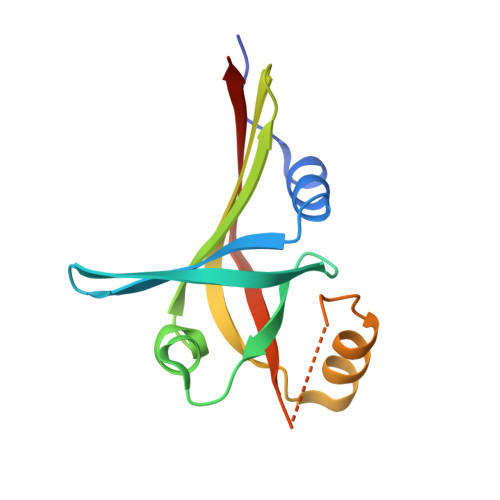FAD-sequestering proteins protect mycobacteria against hypoxic and oxidative stress.
Harold, L.K., Antoney, J., Ahmed, F.H., Hards, K., Carr, P.D., Rapson, T., Greening, C., Jackson, C.J., Cook, G.M.(2019) J Biological Chem 294: 2903-2912
- PubMed: 30567740
- DOI: https://doi.org/10.1074/jbc.RA118.006237
- Primary Citation of Related Structures:
6ECI - PubMed Abstract:
The ability to persist in the absence of growth triggered by low oxygen levels is a critical process for the survival of mycobacterial species in many environmental niches. MSMEG_5243 ( fsq ), a gene of unknown function in Mycobacterium smegmatis , is up-regulated in response to hypoxia and regulated by DosRDosS/DosT, an oxygen- and redox-sensing two-component system that is highly conserved in mycobacteria. In this communication, we demonstrate that MSMEG_5243 is a f lavin- seq uestering protein and henceforth refer to it as Fsq. Using an array of biochemical and structural analyses, we show that Fsq is a member of the diverse superfamily of flavin- and deazaflavin-dependent oxidoreductases (FDORs) and is widely distributed in mycobacterial species. We created a markerless deletion mutant of fsq and demonstrate that fsq is required for cell survival during hypoxia. Using fsq deletion and overexpression, we found that fsq enhances cellular resistance to hydrogen peroxide treatment. The X-ray crystal structure of Fsq, solved to 2.7 Å, revealed a homodimeric organization with FAD bound noncovalently. The Fsq structure also uncovered no potential substrate-binding cavities, as the FAD is fully enclosed, and electrochemical studies indicated that the Fsq:FAD complex is relatively inert and does not share common properties with electron-transfer proteins. Taken together, our results suggest that Fsq reduces the formation of reactive oxygen species (ROS) by sequestering free FAD during recovery from hypoxia, thereby protecting the cofactor from undergoing autoxidation to produce ROS. This finding represents a new paradigm in mycobacterial adaptation to hypoxia.
- From the Department of Microbiology and Immunology, School of Biomedical Sciences, University of Otago, Dunedin 9054, New Zealand.
Organizational Affiliation:


















